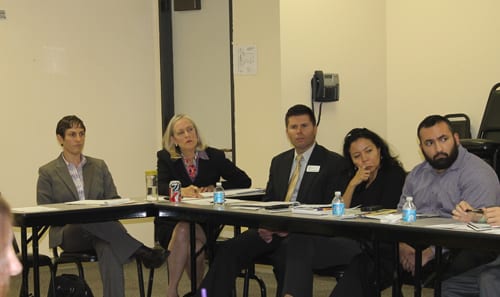
AJ Pearlman, far left, and Marjorie Petty, second from left, with the U.S. Department of Health and Human Services listen to people express concerns about LGBT healthcare at a meeting at Resource Center Dallas on Monday afternoon. (Anna Waugh/Dallas Voice)
Problems, solutions and preventive measures for health issues facing the LGBT community were the topics of a forum Monday afternoon at Resource Center Dallas.
Marjorie Petty, regional director for the U.S. Department of Health and Human Services, and AJ Pearlman with the department’s Office of Intergovernmental and External Affairs in Washington, spoke to a group of about 30 on important healthcare changes over the last year.
Many of the changes were addressed in the HHS LGBT report in April that highlighted implementing nondiscriminatory practices for visitation and health decisions for LGBT families, and funding disease programs that gear advertising toward an LGBT audience.
Pearlman said the report by the HHS LGBT Issues Coordinating Committee looked at the goals from last year and outlined new ones for the upcoming year. Some of the issues tackled within the last year were outside of the doctor’s office, such as an educational effort to prevent obesity and breast cancer among lesbian and bisexual women, training doctors on how to treat LGBT patients’ needs and launching an anti-smoking campaign for LGBT youth.
While the committee looks at issues and disparities facing the LGBT community’s access to healthcare, Pearlman said that little data exists on the issues faced by the community aside from employment discrimination and lack of relationship recognition. She said the department will be collecting data on LGBT citizens in 2013 for the first time, with questions aimed at sexual orientation and gender identity in the National Health Interview Survey.
The remainder of the meeting focused on a discussion about healthcare and preventive care in the local community, as well as broad questions about the investigative process for hospitals who are found to discriminate against LGBT families, funding for various programs, and plans for more research and data collection.
Pearlman said input from those who attended will be taken back to D.C. for future planning of events and preventive programs in the region and nationally.
















